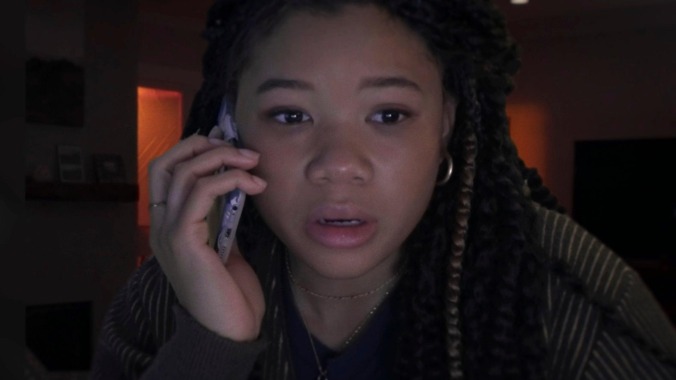Missing review: Storm Reid makes the most of her screen time in a twisty techno-thriller
Missingis a worthy addition to the screenlife genre, thanks to a tight script, solid performances, and innovative cinematography

Screenlife films—that is, films that are shot and edited as if they’re being recorded and displayed on a computer desktop through the apps and programs we use every day—have created a rich niche for themselves within the found footage horror subgenre. Outside the realm of horror, no film has used the format with as much success as 2018’s Searching, a thriller built around investigation through technology rather than scares. Missing is an attempt to replicate the success of Searching by the previous film’s editors, Nicholas D. Johnson and Will Merrick, and though this is their first foray into feature screenwriting and directing, they prove to be extremely capable storytellers within the screenlife niche.
Missing finds us occupying the desktop of a teenager named June (Storm Reid) as her mom Grace (Nia Long) and her mom’s boyfriend Kevin (Ken Leung) head to Colombia for a week-long vacation. However, when Grace and Kevin fail to meet June at the airport after their return flight, June realizes that the FBI’s limited jurisdiction in Colombia is going to be a hindrance to finding her mother. With the help of a friendly gofer (Joaquim de Almeida) hired on the Colombian equivalent of TaskRabbit, June sets out to find the evidence that will reveal the fates of Grace and Kevin.
Those familiar with Missing’s trailer may think the mystery has already been revealed, but thankfully Johnson and Merrick have a few tricks up their sleeve that make the film less predictable than it initially appears. To delve into details would be spoiling the experience, but the film builds a pretty potent conflict around the boundaries of parental trust and the adolescent realization that one’s parents aren’t always who they appear to be, nor are a person’s motives always as simple as the outcome of their actions. This wouldn’t come across nearly as well without a very convincing performance by Storm Reid, who conveys the inner turmoil of a sullen young adult in a time of crisis without tipping over into obnoxious, melodramatic parody.
This is, of course, enhanced by Johnson and Merrick’s direction of the screenlife aspects of the cinematography, which makes playful use of web browsers, FaceTime, Notes, and even Netflix to show a world of information both practical and emotional. Comic relief can be found in the simple indecision of whether the tiniest corner of a bus counts toward what a captcha is looking for, while a mouse pausing over a particular instant message can set off a whole new line of investigative thought without the necessity of a character verbally spelling it out. Johnson and Merrick aren’t reinventing screenlife, but they demonstrate an intimate understanding of how our electronic body language is as powerful a storytelling tool as the dialogue that actors recite, and there arguably isn’t anyone better at using that extension of traditional performance as a storytelling tool.
However, this doesn’t quite allow Missing to escape many of the contrivances that can plague found footage films and mystery thrillers. Johnson and Merrick are gifted enough that the focus on investigation and intrigue makes up for their story’s shortcomings while caught up in the moment, but an examination of the plot can sometimes raise questions. Does the intricacy of what’s ultimately going on reflect a probable plan for abduction or disappearance, or is it just a twisty collection of set-ups and payoffs that are necessary for the movie to work? Would all of these conversations and discoveries actually be captured by the cameras in laptops, smartphones, and smartwatches, or is the film bending over backward to filter every detail through June’s laptop display?
These questions largely rely on one’s ability to suspend disbelief, yet Missing is a thrilling enough ride that it incentivizes the audiences to just go along with it. Johnson and Merrick have handily created a film on par with Searching, translating their skills as editors and virtual cinematographers into a compellingly pulpy story that’s all their own. Screenlife may never be one of the primary ways we tell cinematic stories, but Missing is a prime example of what the format is capable of, tapping into our increasingly digital humanity to excellent effect.
(Missing opens nationwide on January 20, 2023.)